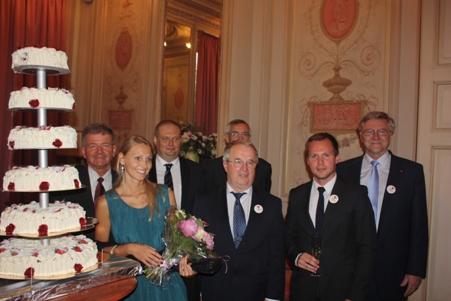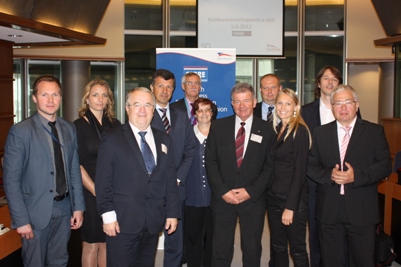CEBRE – Czech Business Representation to the EU celebrates this year the 10th anniversary of its existence in Brussels lobby arena.
Apart from the celebratory evening held at the premises of Prague House, CEBRE also organized a business breakfast with Czech MEPs together with the top representatives of CEBRE founders’ organizations. Among the delegates, who participated in the celebrations, which were held on 4th and 5th June 2012 in Brussels, were Jan Wiesner, Chairman of the Confederation of Employers’ and Entrepreneurs’ Associations of the Czech Republic, Stanislav Kázecký, Vice-president of the Confederation of Industry of the Czech Republic and Radek Pažout, Secretary General of the Czech Chamber of Commerce. CEBRE office celebrated its anniversary together with the Delegation of Prague to the EU established in the EU capital also in 2002.


Czech companies can influence EU legislative process
The ceremony held on 4th June was opened by the speech of the Czech ambassadress to the EU, Her Excellency Milena Vicenová, who thanked both organizations for cooperation, remembered their early days and wished them a lot of success in the years to come. The opening ceremony then continued with the speeches of Lucie Čadilová, Directress of Prague House and Alena Vlačihová, Directress of CEBRE who thanked the founding organizations of CEBRE office and acknowledged their support. Stanislav Kázecký, who spoke on behalf of the founding organizations, stressed the key contribution of CEBRE activities for Czech entrepreneurs, which are, thanks to the representation, closer to the EU legislative process, which they can, therefore, better and more effectively monitor and influence. Furthermore, he wished a lot of future success to the whole team and also thanked important persons, who contributed to the creation and existence of CEBRE. The celebratory evening in Prague House was accompanied by the exhibition of Graphics of the year / Vladimír Boudník Award. The realization of the evening was made possible by the kind contribution of Škoda Auto and AWT Group.
The Czech Republic lacks ability of strategic planning and elites
In the morning of the following day, on 5th June, the representatives of the founding organizations of CEBRE met with Czech Members of the European Parliament at working breakfast, which focused on “Competitiveness and growth”, where they discussed current business environment and its future development in relation to EU policies. Among the present MEPs were Oldřich Vlasák, Vladimír Remek, Richard Falbr, Zuzana Roithová, Miloslav Ransdorf, Jan Březina, Edvard Kožušník, Zuzana Brzobohatá, Pavel Poc and Libor Rouček. Mr. Oldřich Vlasák, vice-president of the European Parliament opened the debate by comparing the EU legislative process with the legislative process in the Czech Republic. While the legislative process in the Czech Parliament lasts eight months on average, the legislative procedure in the European Parliament takes twenty-one months, considering the complexity of the legislative rules and the frequency of the proposals. Although the three times longer process in the EP, MEPs are able to debate over 600 proposals per year on average in comparison to 175 proposals debated on average in the Czech Parliament where 70% of the debated proposals are transposed EU acts. MEP Vlasák also expressed his understanding for business sector, which must have a considerable difficulty to follow the flow of the legislative proposals. In that regard, he stressed the positive contribution of CEBRE – Czech Business Representation to the EU in Brussels, which improves the overall awareness of Czech entrepreneurial public and has become an established and trusted player in the European lobby environment. According to the most of participating MEPs, the Czech Republic lacks right information regarding European affairs. This might play a role in the negative attitude of the Czech public regarding the EU. In relation to this issue, MEP Jan Březina stated, that he sees the main problem in the fact that the Czech political elites are still refusing to be a part of the European integration and are sending out ambiguous signals to the Czech public, which is already reluctant when it comes to European issues. The discussion then continued with the criticism of the quality of the Czech public administration, which is nowadays a very topical issue, because of the dysfunction of the controlling and managing bodies, regarding the management of European funds. In that regard, according to the MEPs, the Czech Republic desperately needs a concept of strategic planning for the distribution of European funds, which is still missing. The need is more urgent because of the fact that the upcoming financial programming period 2014 – 2020 will be probably the last when the Czech Republic will be the net beneficiary. Having said that it is very important to make an effort to benefit from future European funds effectively without any unnecessary losses. “Apart from the cohesion funds the country will have to learn how to benefit from the European programmes such as COSME and HORIZON 2020 which focus on research and development”, added MEP Březina.
EU has its fingers in many pies
Mr. Wiesner continued with his contribution to the debate by expressing the need for deepening mutual cooperation and dialogue about the future of the Czech business, while he pointed out the lack of initiatives supporting growth and the decrease of Czech competitiveness in international comparison. In his speech, Mr. Pažout emphasized some of the key issues, which are at the center of the discussion in the entrepreneurial environment nowadays. According to him, it is the question of progress of the internal market, then the topic of European Company statute and mutual qualifications recognition, energy efficiency, cohesion policy and support to innovation and technology transfer. In connection with the internal market, MEP Zuzana Roithová stressed its importance and she reminded the need to achieve free mobility of knowledge, know-how and better protection of European companies against unfair competition from third countries. According to her, there will be a progress in the area of scientists´ and researchers´ mobility conditions and administrative-author’s legislation. At the same time she blamed the EU for having its fingers in so many pies and not focusing on key issues and not taking strategic goals into account. “The Union often comes out with so many proposals which most of the time do not solve the core issue; on the contrary, they create administrative burden and limit economic freedom”, said Alena Vlačihová in the discussion. Revision of the directive on the tobacco products and many others could be an example. In its contribution, MEP Richard Falbr spoke about the Czech labour market in the context of the EU. According to him the EU initiatives for creation of jobs in European SME are utopian as the demand for new jobs has to come from the market. At the same time, Falbr admitted, that artificially creating a social dialogue in SME environment is not logic mostly because of the family nature of SMEs.





